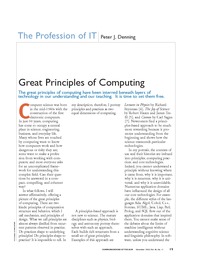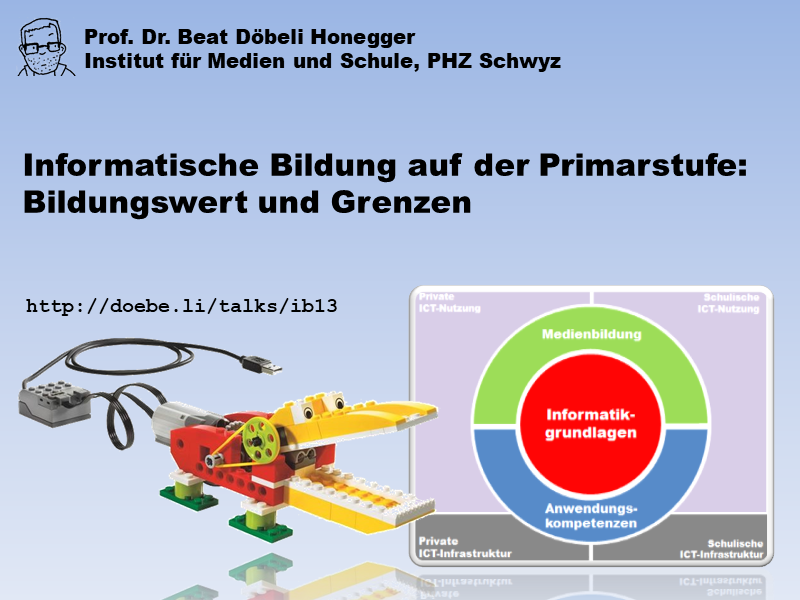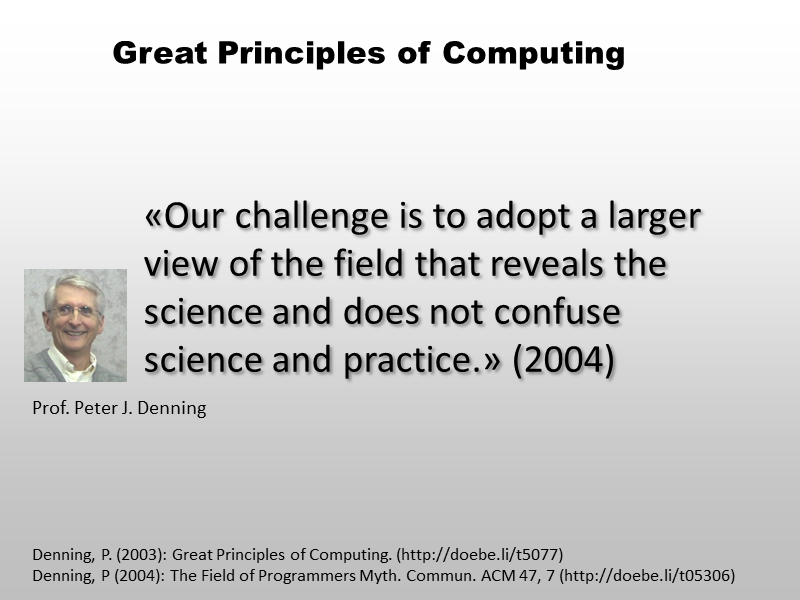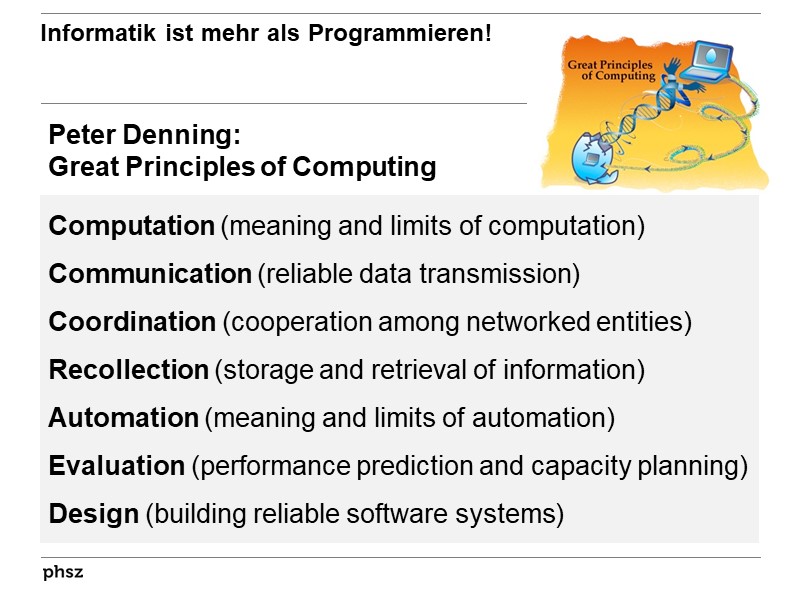Great principles of computingErstpublikation in: Communications of ACM, November 2003.
Publikationsdatum:
|
 |
 Zusammenfassungen
Zusammenfassungen
 The great principles of computing have been interred beneath layers of
technology in our understanding and our teaching. It is time to set them free.
The great principles of computing have been interred beneath layers of
technology in our understanding and our teaching. It is time to set them free. Dieser Text erwähnt ...
Dieser Text erwähnt ...
 Personen KB IB clear | D. E. Comer , Peter Denning , David Gries , Michael C. Mulder , Allen B. Tucker , A. Joe Turner , Paul R. Young | ||||||||||||||||||
 Fragen KB IB clear | Was ist Informatik?What is computer science? | ||||||||||||||||||
 Begriffe KB IB clear |  Algorithmus Algorithmus algorithm
, algorithm
,  Automation (GPoC)
, BerechenbarkeitComputability
, Automation (GPoC)
, BerechenbarkeitComputability
,  Communication (GPoC)
, Communication (GPoC)
,  Computation (GPoC)
, Computation (GPoC)
,  Coordination (GPoC)
, deadlockdeadlock
, Entropieentropy
, Great principles of Computing (GPoC)
, Coordination (GPoC)
, deadlockdeadlock
, Entropieentropy
, Great principles of Computing (GPoC)
,  Hierarchie Hierarchie hierarchy
, Informationinformation
, hierarchy
, Informationinformation
,  Kommunikation Kommunikation communication
, Komplexitätcomplexity
, Konzepte der Informatik
, Kryptographiecryptography
, communication
, Komplexitätcomplexity
, Konzepte der Informatik
, Kryptographiecryptography
,  Netzwerk Netzwerk network
, network
,  Recollection (GPoC)
, Simulation
, Recollection (GPoC)
, Simulation
,  Struktur Struktur structure
, Turing-Maschineturing machine
, Turing-Testturing test structure
, Turing-Maschineturing machine
, Turing-Testturing test
| ||||||||||||||||||
 Texte |
|
 Dieser Text erwähnt vermutlich nicht ...
Dieser Text erwähnt vermutlich nicht ... 
 Nicht erwähnte Begriffe | Design (GPoC), dining philosophers problem, echt enaktiv, Evaluation (GPoC) |
 Tagcloud
Tagcloud
 2 Vorträge von Beat mit Bezug
2 Vorträge von Beat mit Bezug
 Zitationsgraph
Zitationsgraph
 Zitationsgraph (Beta-Test mit vis.js)
Zitationsgraph (Beta-Test mit vis.js)
 Zeitleiste
Zeitleiste
 45 Erwähnungen
45 Erwähnungen 
- Didaktik der Informatik (Sigrid E. Schubert, Andreas Schwill) (2004)

- Is computer science science? (Peter Denning) (2005)


- Recentering Computer Science (Peter Denning, Andrew D. McGettrick) (2005)


- Informatikunterricht planen und durchführen (Werner Hartmann, Michael Näf, Raimond Reichert) (2006)


- Interactive Learning Environments for Mathematical Topics (Ruedi Arnold) (2007)


- LogicTraffic - Logik in der Allgemeinbildung (Ruedi Arnold, Werner Hartmann) (2007)

- InfoTraffic - Teaching Important Concepts of Computer Science and Math through Real-World Examples (Ruedi Arnold, Marc Langheinrich, Werner Hartmann) (2007)


- Creating a Science of Games - Communications of the ACM. Volume 50 , Issue 7 (July 2007) (2007)

- INFOS 2007 - Didaktik der Informatik in Theorie und Praxis - 12. GI-Fachtagung Informatik und Schule (Sigrid E. Schubert) (2007)

- Lehrarrangements in der Informatiklehrerausbildung (Peter K. Antonitsch, Ulrike Lassering, Andreas Söllei)


- Lernzielgraphen und Lernzielerfolgsanalyse (M. Steinert)


- Lehrarrangements in der Informatiklehrerausbildung (Peter K. Antonitsch, Ulrike Lassering, Andreas Söllei)
- ICER 2007 - International Computing Education Research Workshop, ICER '07, Atlanta, GA, USA, September 15-16, 2007 (Richard J. Anderson, Sally Fincher, Mark Guzdial) (2007)
- What is computing? - bridging the gap between teenagers' perceptions and graduate students' experiences (Sarita Yardi, Amy Bruckman) (2007)


- What is computing? - bridging the gap between teenagers' perceptions and graduate students' experiences (Sarita Yardi, Amy Bruckman) (2007)
- Creativity support tools - accelerating discovery and innovation (Ben Shneiderman) (2007)


- Fachdidaktische Diskussion von Informatiksystemen und der Kompetenzentwicklung im Informatikunterricht (Peer Stechert) (2009)


- INFOS 2009 - 13. GI-Fachtagung Informatik und Schule (21. - 24. September 2009 in Berlin) (Bernhard Koerber) (2009)


- Mit iLearnIT.ch spielerisch das Interesse an Informatik wecken (Beat Döbeli Honegger, André Frey, Philippe Braxmeier)


- Mit iLearnIT.ch spielerisch das Interesse an Informatik wecken (Beat Döbeli Honegger, André Frey, Philippe Braxmeier)
- SIGCSE 2010 - Proceedings of the 41st ACM technical symposium on Computer science education, SIGCSE 2010, Milwaukee, Wisconsin, USA, March 10-13, 2010 (Gary Lewandowski, Steven A. Wolfman, Thomas J. Cortina, Ellen Lowenfeld Walker) (2009)
- Braided Teaching in Secondary CS Education - Contexts, Continuity, and the Role of Programming (Arno Pasternak, Jan Vahrenhold) (2010)


- Braided Teaching in Secondary CS Education - Contexts, Continuity, and the Role of Programming (Arno Pasternak, Jan Vahrenhold) (2010)
- Lernzielstrukturen im Informatikunterricht (Markus Steinert) (2010)


- Informatische Bildung im Sachunterricht der Grundschule - Theoretische Überlegungen zur Begründung (Christian Borowski, Ira Diethelm, Ana-Maria Mesaros) (2010)


- EFI-CH Abschlussbericht - Deutschschweiz (Helmar Burkhart, Martin Guggisberg, Beate Kuhnt, Martin Lehmann, Jacqueline Peter, Hasler Stiftung) (2011)

- informatik@gymnasium - Ein Entwurf für die Schweiz (Jürg Kohlas, Jürg Schmid, Carl August Zehnder) (2013)


- 2. Was ist Informatik? (Juraj Hromkovic, Jürg Kohlas)

- 2. Was ist Informatik? (Juraj Hromkovic, Jürg Kohlas)
- The Science in Computer Science (Peter Denning) (2013)


- Fach- und bildungswissenschaftliche Grundlagen für den Informatikunterricht in der Sekundarstufe I (Arno Pasternak) (2013)


- Informatik erweitert Horizonte - 15. GI-Fachtagung "Informatik und Schule" - INFOS 2013 - 26.- 28.09.2013 (2013)


- Informatik ist mehr als Informatik! - Oder: Warum sich die Informatik mit dem Leitmedienwechsel befassen muss (Beat Döbeli Honegger) (2013)


- Informatik ist mehr als Informatik! - Oder: Warum sich die Informatik mit dem Leitmedienwechsel befassen muss (Beat Döbeli Honegger) (2013)
- WiPSCE 2014 - Proceedings of the 9th Workshop in Primary and Secondary Computing Education, Berlin, Germany, November 5-7, 2014 (Carsten Schulte, Michael E. Caspersen, Judith Gal-Ezer) (2014)
- Starting from scratch - experimenting with computer science in Flemish secondary education (Francis Wyffels, Bern Martens, Stefan Lemmens) (2014)


- A comparison of the field data management and its representation in secondary CS curricula (Andreas Grillenberger, Ralf Romeike) (2014)


- Starting from scratch - experimenting with computer science in Flemish secondary education (Francis Wyffels, Bern Martens, Stefan Lemmens) (2014)
- Vielfalt der Informatik (Anja Zeising, Claude Draude, Heidi Schelhowe, Susanne Maass) (2014)


- Die Informatisierung der Lebenswelt - Der Strategiewandel algorithmischer Alltagsbewältigung (Hans D. Hellige)

- Die Informatisierung der Lebenswelt - Der Strategiewandel algorithmischer Alltagsbewältigung (Hans D. Hellige)
- Subjektive Theorien von Informatiklehrkraften zur fachdidaktischen Strukturierung ihres Unterrichts (Ana-Maria Stoffers) (2015)


- Konzeption eines Informatik-Schülerlabors und Erforschung dessen Effekte auf das Bild der Informatik bei Kindern und Jugendlichen (Nadine Bergner) (2015)


- Learner-Centered Design of Computing Education - Research on Computing for Everyone (Mark Guzdial) (2015)


- Mehr als 0 und 1 - Schule in einer digitalisierten Welt (Beat Döbeli Honegger) (2016)


- 6. Wozu Informatik? (2016)

- 6. Wozu Informatik? (2016)
- Proceedings of the 11th Workshop in Primary and Secondary Computing Education (WiPSCE 2016) - Münster, Germany, October 13-15, 2016 (Jan Vahrenhold, Erik Barendsen) (2016)
- What children ask about computers, the Internet, robots, mobiles, games etc (Christian Borowski, Ira Diethelm, Henning Wilken) (2016)


- What children ask about computers, the Internet, robots, mobiles, games etc (Christian Borowski, Ira Diethelm, Henning Wilken) (2016)
- Entwicklung und Validierung eines Instruments zur Messung des Wissens über Fehlvorstellungen in der Informatik (Laura Ohrndorf) (2016)


- Misconceptions About Computer Science (Peter Denning, Matti Tedre, Pat Yongpradit) (2017)


- Remaining Trouble Spots with Computational Thinking - Addressing unresolved questions concerning computational thinking. (Peter Denning) (2017)


- Unterrichtsmethoden für den Informatikunterricht (Andreas Zendler) (2018)


- 6. Lerneffektivität ausgewählter Methoden (Andreas Zendler, The Instructional Method Group)


- 6. Lerneffektivität ausgewählter Methoden (Andreas Zendler, The Instructional Method Group)
- HDI 2018 - 8. Fachtagung des GI-Fachbereichs Informatik und Ausbildung/Didaktik der Informatik (Nadine Bergner, René Röpke, Ulrik Schroeder, Detlef Krömker) (2018)


- Was jeder über Informatik lernen sollte - Eine Analyse von Hochschulkursen für Studierende anderer Fachrichtungen (Stefan Seegerer, Ralf Romeike)

- Was jeder über Informatik lernen sollte - Eine Analyse von Hochschulkursen für Studierende anderer Fachrichtungen (Stefan Seegerer, Ralf Romeike)
- From Embedded Systems to Physical Computing - Challenges of the Digital World in Secondary Computer Science Education (Mareen Przybylla) (2018)


- Eine digitale Perspektive für den Sachunterricht - ein Vorschlag zur Diskussion (Martin Brämer, Philipp Straube, Hilde Köster, Ralf Romeike) (2020)


- Informatik für alle - Beitrag und exemplarische Ausgestaltung informatischer Bildung als Grundlage für Bildung in der digitalen Transformation (Stefan Seegerer) (2021)


- WiPSCE '21 - The 16th Workshop in Primary and Secondary Computing Education, Virtual Event / Erlangen, Germany, October 18-20, 2021 (Marc Berges, Andraes Mühling, Michal Armoni) (2021)
- Fundamentals of Physical Computing - Determining Key Concepts in Embedded Systems and Hardware/Software Co-Design (Mareen Przybylla, Andreas Grillenberger) (2021)


- Fundamentals of Physical Computing - Determining Key Concepts in Embedded Systems and Hardware/Software Co-Design (Mareen Przybylla, Andreas Grillenberger) (2021)
- Computational Thinking in Education - A Pedagogical Perspective (Aman Yadav, Ulf Dalvad Berthelsen) (2021)

- Informatikunterricht zwischen Aktualität und Zeitlosigkeit - 20. GI-Fachtagung Informatik und Schule (Lutz Hellmig, Martin Hennecke) (2023)


- Wirksamer Informatikunterricht (Dennis Komm) (2024)

- Aufarbeitung der Entwicklungen der Informatikdidaktik im deutschsprachgen Raum zwischen ca. 1990 - 2023 (Philipp Rüeger) (2024)

- Was alle über Künstliche Intelligenz wissen sollen und wie KI-bezogene Kompetenzen in der Schule entwickelt werden können - Weiterführende Überlegungen zum GI-Positionspapier „Künstliche Intelligenz in der Bildung“ (Daniel Losch, Steffen Jaschke, Tilman Michaeli, Simone Opel, Ute Schmid, Stefan Seegerer, Peer Stechert) (2025)



 Volltext dieses Dokuments
Volltext dieses Dokuments
 |  Great principles of computing: Artikel als Volltext ( Great principles of computing: Artikel als Volltext ( : :  , 79 kByte; , 79 kByte;  : :  2020-11-28) 2020-11-28) |
 |  Great principles of computing: Artikel als Volltext ( Great principles of computing: Artikel als Volltext ( : :  , 79 kByte; , 79 kByte;  : :  Link unterbrochen? Letzte Überprüfung: 2020-11-28 Letzte erfolgreiche Überprüfung: 2015-02-28) Link unterbrochen? Letzte Überprüfung: 2020-11-28 Letzte erfolgreiche Überprüfung: 2015-02-28) |
 Anderswo suchen
Anderswo suchen 
 Beat und dieser Text
Beat und dieser Text
Beat war Co-Leiter des ICT-Kompetenzzentrums TOP während er Dieser Text ins Biblionetz aufgenommen hat. Die bisher letzte Bearbeitung erfolgte während seiner Zeit am Institut für Medien und Schule. Beat besitzt kein physisches, aber ein digitales Exemplar. Eine digitale Version ist auf dem Internet verfügbar (s.o.). Beat hat Dieser Text auch schon in Vorträgen erwähnt.












 Biblionetz-History
Biblionetz-History